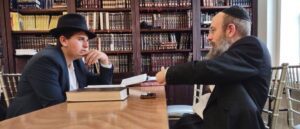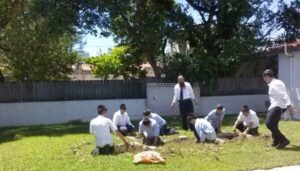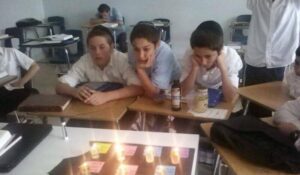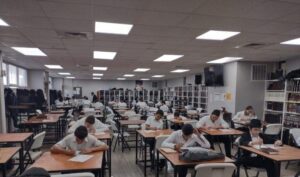 Meet the Chinuch Shluchim: Rabbi Eily Smith of the Mesivta at Lubavitch Educational Center (LEC) in Miami, Florida, on a powerful experience that transformed his teaching, instilling confidence, and teaching teenagers versus adults.
Meet the Chinuch Shluchim: Rabbi Eily Smith of the Mesivta at Lubavitch Educational Center (LEC) in Miami, Florida, on a powerful experience that transformed his teaching, instilling confidence, and teaching teenagers versus adults.
“Meet the Chinuch Shluchim” is jointly presented by the Menachem Education Foundation (MEF) and COLlive.com Community News Service. The series features Chabad teachers from different states, countries and demographics speaking about their life and Chinuch Shlichus.
Background:
After I got married, I moved to Miami for Kollel under Rabbi Sholom Ber Lipskar. I was in Kollel for two years and then helped lead a Smicha program and various adult education classes for the community.
My Unexpected First Job at a School:
When those programs came to an end, I wanted a full-time teaching position. In 2009, I cold-called LEC in Miami Beach and offered my services as a teacher. I left a voicemail saying I was interested in any available position. No one called me back. After a few weeks, the English principal called me, unconnected to my previous call. She told me that someone had mentioned that there was a rabbi looking for a job. She apologized that she didn’t have a position for me in Judaic studies but offered me a job teaching science and social studies to 7th-grade boys.
It was not exactly what I was looking for, but a job is a job. That first year I ended up teaching general studies but soon added some Kodesh classes as well, building up to a full-time job.
A Switch to Judaics:
LEC as a school and the Miami community as a whole have evolved over the years, and four years ago, there was a major switch from a dual curriculum program to one that was full-time Kodesh with a dormitory. I took on a position in the administration to help oversee curriculum and student discipline while also teaching classes.
Mesivta Bochrim Versus Adult Education:
The transition from teaching adult education to teenagers was an adjustment. I was used to teaching adult students who very much wanted to be there. They paid money, took time out of busy schedules, and even came in from out of the city to be able to listen. There is a sense of fulfillment in teaching students who are eager to learn.
When I started teaching at the middle school, I was not used to a crowd that didn’t necessarily want to be there. I also did not have much experience dealing with classroom management or behavioral disruptions. I was used to a world where you prepare a lot before the lesson and then give it over. In a 7th-grade classroom, you can prepare as much as you want, but the teaching that takes place in the classroom is based on relationships, not just material.
I would compare it to a general dentist versus a pediatric dentist. They both went to dental school, but the pediatric dentist learns an entirely new science when it comes to practical patient care.
On Which One He Prefers:
I actually started teaching adult education classes again so I am doing both now. I enjoy the variety because it prevents burnout. I get a different satisfaction and fulfillment from each one.
When I Realized I Was Doing It All Wrong:
I first started teaching young boys I was very concerned about classroom management. I was a strict teacher and wanted to be in control of my class. When recess came, the students burst out of the room for freedom. Then one time I went to observe another teacher in a different school and saw the opposite experience. At recess, all the students surrounded him asking how to get involved in various programs he was running, and engaging in learning related topics in between playing basketball.
I instantly realized I was doing it all wrong.
The next day, I went in and introduced a new reward and incentive program to engage the students. I gave out class jobs, we developed a class currency based on Gemara concepts, and suddenly everyone was involved and was having fun in learning. I saw a tremendous change in my students. I don’t know if they ended up learning more material than they did with my previous teaching methods – test grades didn’t necessarily change – but they loved Torah a lot more.
In teaching Gemara, we need to ask ourselves, “Will our students pursue learning later in life?” That will only happen if learning was a positive experience for them.
Giving Students a Confidence Boost:
I teach Gemara to students who are learning at the basic level and my goal for this level is always to give them a feeling of mastery very quickly. I set up the learning in a simple way so that every day they feel confident that they know how to learn and understand the material. Whether it is a focus on familiarity with Gemara vocabulary or facilitating Chavrusa learning so they learn the technique of cooperative learning, I try to make the classroom foolproof. By removing the students’ anxiety of inadequacy in the classroom, we can set students up for success. On the other hand, the goal for the more advanced students is to show the complexity and depth of the subjects.
That Extra Feeling of Nachas:
Sometimes during Mesivta applications, we are advised not to take a certain student for whatever reason and we accept him anyways. Often that same boy will go on to become a star bochur. There’s a special feeling of nachas in having ignored that advice and giving each boy a chance to shine.
On Continuing to Learn as a Teacher:
I am always doing some sort of learning to advance my skills in teaching. I try to seek out areas where I feel I could use improvement or an area that is new to me. In the summer, I organize a Kollel for teachers from a variety of schools to advance their teaching methods, to share their techniques and prepare for their year.








